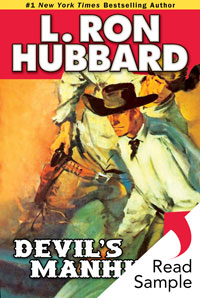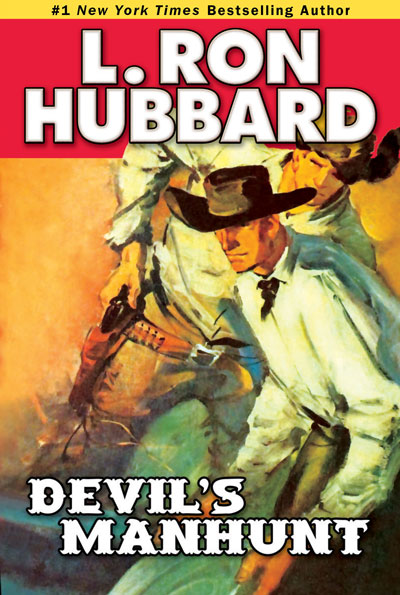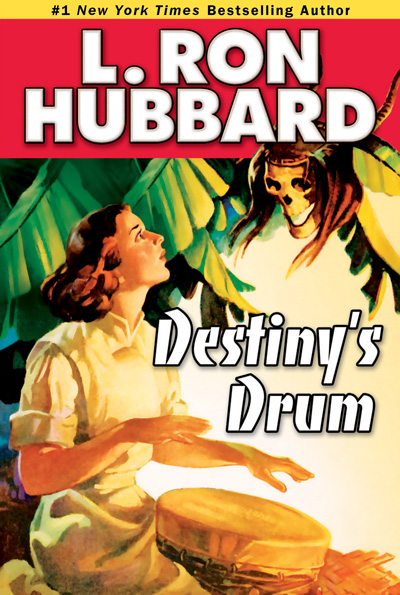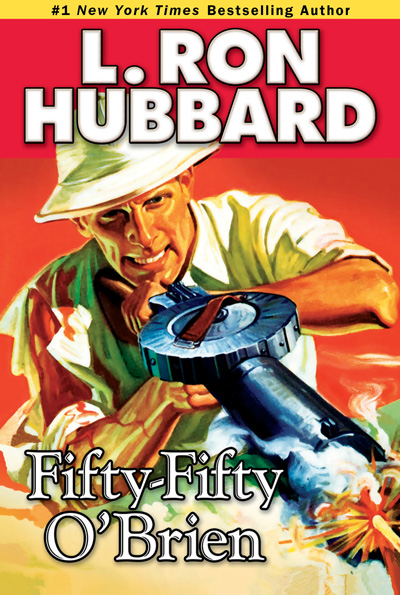In the Arizona territory, every mountain hides a fortune—and every man fends for himself.
Tim Beckdolt, rangy and self-reliant, is as American as the frontier itself. But after spending eight treacherous months digging $175,000 in gold out of Desperation Peak—all he has left is desperation. Two sadistic strangers have taken his gold, and now they want to take his life. He’s on the run—the target of a Devil’s Manhunt.
In a time and a place where the only law is the law of survival, Beckdolt will have to live by his wits … or die by the bullet.
Also includes two additional Western tales: “Johnny, the Town Tamer,” the story of a local swindler who meets his match; and “Stranger in Town,” in which a drifter confronts a corrupt sheriff … and his own dark past.
“A thrilling novel of greed, violence, survival, and perseverance, Devil’s Manhunt perfectly embodies the unbridled excitement of pulp fiction.” —Midwest Book Review
SAMPLE

ABOUT THE AUTHOR
In 1932, L. Ron Hubbard led a mining crew on a six-month West Indies Mineralogical Expedition in Puerto Rico—the first complete survey of the island since it had become an American territory. It was an experience that informs this title with remarkable realism.
Devil’s Manhunt Glossary
Stories from the Golden Age reflect the words and expressions used in the 1930s and 1940s, adding unique flavor and authenticity to the tales. While a character’s speech may often reflect regional origins, it also can convey attitudes common in the day. So that readers can better grasp such cultural and historical terms, uncommon words or expressions of the era, the following glossary has been provided.
alkali: a powdery white mineral that salts the ground in many low places in the West. It whitens the ground where water has risen to the surface and gone back down.
bead on, take a: to take careful aim at. This term alludes to the bead, a small metal knob on a firearm used as a front sight.
blamed: confounded.
blue chip: a poker chip having a high value.
boot: saddle boot; a close-fitting covering or case for a gun or other weapon that straps to a saddle.
buffalo gun: .50-caliber Sharps rifle, also called the “Big Fifty,” which weighed twelve pounds. Noted for its power and range, it was the almost unanimous choice among buffalo hunters. The drawbacks were the cost of ammunition and the fact that the rifle’s accuracy was seriously affected by rapid fire (it had to be watered down constantly to keep from overheating).
calabozo: (Spanish) jail.
Colt: a single-action, six-shot cylinder revolver, most commonly available in .45- or .44-caliber versions. It was first manufactured in 1873 for the Army by the Colt Firearms Company, the armory founded by American inventor Samuel Colt (1814–1862) who revolutionized the firearms industry with the invention of the revolver. The Colt, also known as the Peacemaker, was also made available to civilians. As a reliable, inexpensive and popular handgun among cowboys, it became known as the “cowboy’s gun” and a symbol of the Old West.
cowpuncher: a hired hand who tends cattle and performs other duties on horseback.
Derringer: a pocket-sized, short-barreled, large-caliber pistol. Named for the US gunsmith Henry Deringer (1786–1868), who designed it.
drag: the rear of a column of cattle on the trail. It includes the footsore, the weak, the young calves, the weary and the lazy. The drag position is no fun for the hands assigned to ride it—they have to make the sick and the stragglers keep up, chase the breakaways and suffer the dust. Since it is unpleasant, green hands usually get assigned to ride drag.
fan: to fire a series of shots (from a single-action revolver) by holding the trigger back and successively striking the hammer to the rear with the free hand.
Giant: Giant powder; dynamite manufactured by the Giant Powder Co, the first US dynamite manufacturing plant, in 1870 in San Francisco, California. “Giant powder” was a long time synonym for dynamite in the US.
gig: a light carriage, with one pair of wheels, drawn by one horse.
G-men: government men; agents of the Federal Bureau of Investigation.
gumbo: soil that turns very sticky and muddy when it becomes wet; found throughout the central US.
half-breed: a person with parents of different races, usually a white father and Native American mother. The term originated in the East, not the Western frontier.
hoss: horse.
hostler: a person who takes care of horses, especially at an inn.
jenny: a female donkey.
jimminies, by: a mild exclamation of surprise, emotion or awe.
larrup: to beat, flog or thrash, said of a horse to make it go faster.
livery stable: a stable that accommodates and looks after horses for their owners.
Martini-Henry: a breech-loaded .45-caliber rifle adopted in 1871 as the standard British service weapon, named after its inventors.
Mickey Finn: a drug-laced drink given to someone without their knowledge in order to incapacitate them. Named after a bartender who, before his days as a saloon proprietor, was known as a pickpocket and thief who often preyed on drunken bar patrons.
mow: haymow; the upper floor of a barn or stable used for storing hay.
owl-hoot: outlaw.
parley: to talk or negotiate, especially with an enemy.
Peacemaker: nickname for the single-action (that is, cocked by hand for each shot), six-shot Army model revolver first produced in 1873 by the Colt Firearms Company, the armory founded by Samuel Colt (1814–1862). The handgun of the Old West, it became the instrument of both lawmaker and lawbreaker during the last twenty-five years of the nineteenth century. It soon earned various names, such as “hog leg,” “Equalizer,” and “Judge Colt and his jury of six.”
placer: a waterborne deposit of gravel or sand containing heavy ore minerals, as gold, which have been eroded from their original bedrock and concentrated as small particles that can be washed out.
poke: a small sack or bag, usually a crude leather pouch, in which a miner carried his gold dust and nuggets.
Prop.: Proprietor.
puncher: a hired hand who tends cattle and performs other duties on horseback.
quirt: a riding whip with a short handle and a braided leather lash.
rannies: ranahans; cowboys or top ranch hands.
riffles: in mining, the strips of metal or wooden slats fixed to the bottom of a rocker box or sluice (a long sloping trough into which water is directed), that run perpendicular to the flow of water. The weight of the gold causes it to sink, where it is captured by these riffles.
Scheherazade: the female narrator of The Arabian Nights, who during one thousand and one adventurous nights saved her life by entertaining her husband, the king, with stories.
sidewinder: rattlesnake.
sinks: depressions in the land surface where water has no outlet and simply stands. The word is usually applied to dry lakebeds, where the evaporating water has left alkali and other mineral salts.
slug: a bullet.
sluice: sluice box; a long, narrow wood or metal artificial channel that water passes through when put in a creek or stream to separate the dirt and junk material away from the gold. Gold, a very dense metal, stays in the sluice box because of its heavy weight.
“Streets of Laredo”: a song, also known as the “Cowboy’s Lament.” It is a famous cowboy ballad in which a dying cowboy dispenses his advice to another.
trail herd: a herd of cattle driven along a trail, especially from their home range to market.
waddy: a cowboy, especially one who drifts from ranch to ranch and helps out in busy times. In the spring and fall when some ranches were short-handed, they took on anyone who was able to ride a horse and used him for a week or so; hence the word waddy, derived from wadding—anything to fill in. Some cowmen used the word to mean a cattle rustler; later it was applied to any cowboy.
war sack: a cowboy’s bag for his personal possessions, plunder, cartridges, etc. Often made of canvas but sometimes just a flour or grain sack, it is usually tied behind the saddle.
Winchester: an early family of repeating rifles; a single-barreled rifle containing multiple rounds of ammunition. Manufactured by the Winchester Repeating Arms Company, it was widely used in the US during the latter half of the nineteenth century. The 1873 model is often called “the gun that won the West” for its immense popularity at that time, as well as its use in fictional Westerns.
wind devils: spinning columns of air that move across the landscape and pick up loose dust. They look like miniature tornados, but are not as powerful.
Yucatán: a peninsula mostly in southeastern Mexico between the Caribbean Sea and the Gulf of Mexico.












